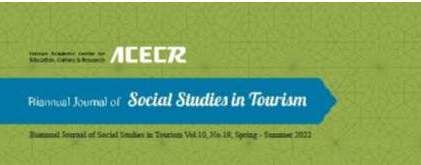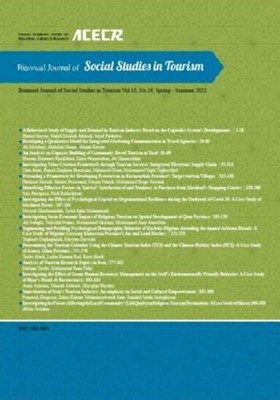Presenting a Framework for Developing Ecotourism in Kermanshah Province's Target tourism Villages
Subject Areas :heshmat moradi 1 , Alireza Poursaeid 2 * , Marjan vahedi 3 , mohamad bagher Arayesh 4
1 -
2 -
3 -
4 -
Keywords: Ecotourism Development, Coding, Tourism, Kermanshah,
Abstract :
Ecotourism is a sustainable strategy for earning revenues while preserving natural resources. Therefore, this study set out to provide a framework for developing ecotourism in Kermanshah province's target tourism villages using grounded theory. The required data were collected via semi-structured interviews with 20 experts who were selected through snowball sampling. The collected data were then analyzed in Maxqda12 software using open coding, axial coding, and selective coding approach, resulting in 433 codes, 124 concepts, 23 sub-categories, and 6 main categories. The main categories of the model included causal categories (participatory, economic, regional attractions and potentials, policy, social and cultural, managerial, infrastructure, ecotourism services and facilities, and the core category of ecotourism development), intervening categories (economic, managerial, and educational), strategic categories (economic and educational), and consequential categories (positive and negative economic consequences, and social, cultural and environmental consequences) were grouped together in a paradigmatic framework.
آنسلم استراس. و جولیتام، کوربین. (1378). «اصول روش تحقیق کیفی: نظریه مبنایی، رویهها و شیوهها». ترجمه بیوک محمدی. تهران: پژوهشگاه علوم انسانی و مطالعات فرهنگی. امیدی نجف آبادی، مریم. حق بین، آنیتا. فرج الله حسینی، جمال. (1395). «بررسی عوامل مؤثر بر توسعه اکوتوریسم؛ مطالعه موردی: لواسان کوچک». فصلنامه پژوهشهای ترویج و آموزش کشاورزی، سال نهم، شماره 3 ، صص،11-22. باغانی، محمد. (1396). «تأثیر اکوتوریسم بر توسعه گردشگری روستایی: مطالعه موردی منطقه گردشگری زعفرانیه سبزوار». پایان نامه کارشناسی ارشد، دانشگاه سمنان، دانشکده گردشگری، صص 1102-108. بیگ محمدی، حسن. و حاتمی، مجتبی. (1389). «تحلیل جغرافیایی روند مهاجرت در استان آذربایجان شرقی (1385 – 1365)»، فصلنامه جغرافیایی آمایش محیط، دوره3، شماره 10، صص 23-42. حیدری ساربان، وکیل. (1396). «عوامل مؤثر بر توسعه گردشگری روستایی از دیدگاه مردم محلی (مورد مطالمه دهستان سردابه شهرستان اردبیل)». فصلنامه علمی - پژوهشی گردشگری و توسعه، سال ششم، شماره سوم، صص 198-177. خسروی، عادل. (1397). تحلیل راهبردی توسعه اکوتوریسم در شهرستان گالیکش با استفاده از مدل SWOT». پایان نامه کارشناسی ارشد، موسسه آموزش عالی عمران و توسعه، دانشکده آبادانی و توسعه روستاها ،.85 صفحه. داودی، علی. (1394). «تحلیلی بر چالشهای توسعه اکوتوریسم دره پیام شهرستان مرند». پایان نامه جهت اخذ مدرک کارشناسی ارشد، دانشگاه تبریز، دانشکده جغرافیا وبرنامه ریزی صص 118-125. رضوانی، ع.(1392). جغرافیا و صنعت توریسم. چاپ 13، صص 16– 1. تهران: دانشگاه پیا م نور. ریچارد شارپلی، ج. (1390). «گردشگری روستایی»، ترجمه نصیری و منشی زاده، انتشارات منشی، تهران، 1380. سپهوند، رضا. جعفری، محمد. و احمدی، امین. (1397). «برنامه¬ریزی راهبردی توسعه اکوتوریسم روستایی (مطالعه موردی: روستای ایستگاه بیشه». پژوهش های جغرافیای انسانی، دوره ۵۰، شماره ۲، صفحات. 276-263. شاطریان، محسن. کیانی سلمی، صدیقه. و زورمند، پریناز. (1397). «شناسایی و تبیین علّی عوامل مؤثر بر فرصتهای کارآفرینی در مناطق کویری با رویکرد اکوتوریسم (نمونه موردی: کویر مرنجاب». فصلنامه علمی پژوهشی و بین المللی انجمن جغرافیای ایران، دوره 6، شماره 57، صص:95-83. شاطریان، محسن. کیانی سلمی، صدیقه.، غلامی، یونس. ومنتصری، زهرا. (1396). «اولویت بندی عوامل مؤثر بر توسعه طبیعت گردی روستاهای بخش برزک-کاشان با تلفیق تکنیکهای ANP وDEMATEL»، نشریه تحقیقات کاربردی علوم جغرافیایی، سال هفدهم، شماره 44، صص،154-131. صالحی، صادق. (1396). «توسعه بومگردی با تأکید بر مشارکت جوامع محلی (مطالعه موردی: روستای جنت رودبار، شهرستان رامسر)». مجلّة پژوهش و برنامه ریزی روستایی، سال 6، شمارة 3، صص 201-185. قبادی،پرستو. (1389). «مطالعه ی مشکلات و محدودیت های توریسم روستایی استان کرمانشاه». پایاننامه کارشناسی ارشد، دانشگاه رازی ، دانشکده علوم کشاورزی، گروه ترویج و آموزش کشاورزی،صص190-205. قدیری، مجتبی. استعلاجی، علیرضا. و پازکی، معصومه. (1389). گردشگری پایدار روستایی و عشایری. تهران: انتشارات دانشگاه تهران ، چاپ اول. کاظمی، غ. (1385). «تدوین الگوی مدیریت اکوتوریسم منطقه حفاظت شده مانشت و قلارنگ». پایان نامه کارشناسی ارشد، رشته مدیریت محیط زیست، دانشگاه علوم و تحقیقات خوزستان، صص69-73. قنادی، نسیم. (1395). «ارزیابی راهبردهای توسعه اکوتوریسم منطقه ارسباران». پایان نامه کارشناسی ارشد در رشته برنامه ریزی گردشگری، دانشگاه تبریز، دانشکده جغرافیا و برنامه ریزی، گروه پژوهشی جغرافیا، صص 112-120. لونت، آلتینی. و الکساندروس، پاراسکواس. (1394). روش تحقیق در گردشگری و هتلداری. مترجمان: صادق صالحی، پگاه ایزدی، سالار کهزادی، زهرا پازوکینژاد، صص،153-152. تهران: مهکامه. مصاحب، شیوا و خاکسار، داریوش. (۱۳۹۲). «دفاتر ICT و فناوری اطلاعات راهکاری برای توسعه اقتصادی، اجتماعی روستاها (تحقیق موردی: دهستان خسروشیرین از شهرستان آباده)»، کنفرانس مدیریت، چالشها و راهکارها، شیراز. مطلبــی، قاسم. و جــوان فروزنــده، علی. (1390). «مفهوم حس تعلق به مکان و عوامل تشکيل دهنده آن». هويت شهر، دوره 5 , شماره 8 ، صص،37-27. مرکز آمار ایران. (1395). سالنامه آماری کشور. چاپ اول .ص 184. منوچهری، مریم. (1395). «ارزیابی توان طبیعت گردی منطقه ناهارخوران با استفاده از تصاویر ماهواره ای و سامانه اطلاعات جغرافیایی». پایان نامه کارشناسی ارشد، دانشگاه مازندران، دانشکده منابع طبیعی، صفحه 25. میرسنجری، م. (۱۳۸۵). «راهبرد اکوتوریسم بر پایه توسعه پایدار». فصلنامه جنگل و مراتع، شماره 71، صص 10-7. Blancas, F. Lozanooyola, M. Gonalez, M. (2015). A European Sustainable Tourism Labels proposal using a composite indicator , Environmental Impact Assessment, Review 54, pp 38-54. Ehsani, A. (2016). A Road to Sustainable Tourism, [in Persian], Tehran:Mahkameh Publications. Daniel, J. (2013). Economics Impacts of Tourism, the flasher Press London ,Washington, D.C,6(15), 421-431. Elizabeth Joy,M. (2002). Ecotourism: Are current practices delivering desired outcomes? A comparative case study analysis. Major Paper submitted to the Faculty of the Virginia Polytechnic Institute and State University in partial fulfillment of the requirements for the degree of Master of Urban and Regional Planning in Urban Affairs and Planning. Erkara,A., Roza, B. & Nurlan, T. (2017). Model of sustainable development of tourism industry in Kazakhstan (regional perspective), viesoji politika ir 2017, 16( 2 ), pp: 179–197. and administration policy public Administravimas Funda. Ü. (2018). Dünyada ve Türkiye’de Ekoturizm, Sosyal-Kültürel ve Ekonomik Katkıları. Ulusal Çevre Bilimleri Araştırma Dergisi, 1(2), pp: 69-72. García, M. (2017). Towards a new approach of destination loyalty drivers: satisfaction, visit intensity and tourist motivations", Current Issues in Tourism, 20(3), pp. 238-260. Gigović, L., Pamučar, D., Lukić, D. & Marković, S., (2016). GIS-Fuzzy DEMATEL MCDA Model for the Evaluation of the Sites for Ecotourism Development: A Case Study of Dunavski ključ” Region, Serbia, Land Use Policy, 59, PP: 348–365.
Grashiela, M. Aguila, R. (2014). Ecotourism Industry in Ilijan Batangas City, Philippines: Assessing Its Effects as a Basis of Proposed Tourism Development Plan. Quarterly, Journal of Business Studies , 1(1), pp:24-35. Hea, Peng, Hea ,Yong & Xub, Feifei. (2018). Evolutionary Analysis of Sustainable Tourism, Annals of Tourism Research, 69 (2018) 76–89. Lane, B. (2018). Will Sustainable Tourism Research Be Sustainable in the Future? An Opinion Piece, Tourism Management Perspectives, 25 (2018), 161–164. Liu, B. & Mwanza, F. (2014). Towards sustainable tourism development in Zambia: advancing tourism planning and natural resource management in Livingstone (Mosi-oa-Tunya) Area. Journal of Service Science and Management, 7, pp:30-45. MacCannel, D. (1976). The Tourist: A New Theory of the Leisure Class. New York: The Macmilan Press LTD: 17,p: 178. Mathews, J. A. (2002). Dragon multinational: A new model for global growth. Oxford University Press on Demand.accessable Persistent link : https :// Econ Papers . repec .org /RePEc :oxp:obooks:9780195121469. Moore, A & Ross.K , (2014).Dowling Nature Trail National Parks, Wildlife Reserve and Conservation Area. Available: http://www.allnepal. com/nepal/natural _places.php. Accessed 15 July 2018 Pandit, N. R. (1996). The Creation of Theory: A Recent Application of the Grounded Theory Method. The Qualitative Report, 2(2). Vicente,R. Akarapong , U. &Mingsarn,K. (2014). Factors Influencing Local Resident Support for Tourism Development: A Structural Equation Model1, Department of Applied Economics The University of the Balearic Islands, Spain,. Available https://www.researchgate.net/publication/260312058. Accessed 20 March 2018.pp:17-18 UNWTO )World Tourism Organization(, (2018). Annual Report 2017, UNWTO, Madrid, DOI: https://doi.org/10.18111/9789284419807.

